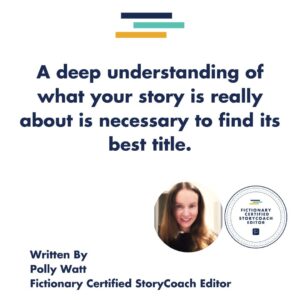
Your book title has a huge job to do. Simultaneously, it must:
- Hook readers/agents/publishers into reading your novel (or at least into reading the blurb and investigating further)
- Appeal to the right readers (your target audience), thus ensuring, e.g., romance aficionados don’t mistakenly buy your high-octane dystopian thriller, then slam you with bad online reviews when your story doesn’t meet their expectations
- Help readers remember your book and recommend it to all their friends
- Satisfy your own expectations of what your published book should look like
- Encapsulate and reflect the core of your novel—its soul, its inner message, it’s true being
That’s a lot of pressure on a few small words in a book title!
If you’re struggling to find a book title, then—unsurprisingly—numerous resources exist to help. Check out this blog, which will link you to various online book title generator tools.
A few initial questions may help you brainstorm a book title

Does your book centre around an unusually-named character? Might this memorable name work well in a title? And if so, can you hint at the genre as well? Some examples of such book titles include:
- Harry Potter and the Philosopher’s Stone by J K Rowling (Fantasy).
- The Seven Lives of Evelyn Hardcastle by Stuart Turton (Speculative).
- Eleanor Oliphant is Completely Fine by Gail Honeyman (Women’s fiction).
- The Great Gatsby by F. Scott Fitzgerald (Literary fiction/ social satire/ tragedy).
Is your book about a place or a community, rather than a single protagonist? Then you might choose a book title like:
- Middlemarch by George Eliot
- Middlesex by Jeffrey Eugenides
- The Night Circus by Erin Morgenstern
Is your book ultimately about a particular theme? If so, might it help your readers to know this from the offset?
- Pride and Prejudice by Jane Austen
- War and Peace by Fyodor Dostoevksy
- Atonement by Ian McEwan
Many book titles (especially within the category of literary fiction) show their theme metaphorically, or through imagery:
- Burnt Shadows by Kamila Shamsie. (A story about the long generational shadows cast by Hiroshima and other Western bombs.)
- Wolf Hall by Hilary Mantel. (Wolf Hall is an actual place in this novel, but it’s also a metaphorical title, referring to the entire Tudor Court as a predatory, dog-eat-dog world.)
- The Binding by Bridget Collins. (A magical book-binding process extracts a person’s memories from their brain and seals them onto the page. But can bonds of love ever truly be excised from the heart?)
Does your book title clearly indicate your story’s genre?
- Thriller: Gone Girl by Gillian Flynn
- Romance: The Viscount Who Loved Me by Julia Quinn
- Crime: The Thursday Murder Club by Richard Osman
- Historical: The Last Tudor by Philippa Gregory
- Fantasy: Throne of Glass by Sarah J Maas
- Sci-Fi: The Hitchhiker’s Guide to the Galaxy by Douglas Adams
Do you want your book title to make readers ask questions?
- The Hate You Give by Angie Thomas (What hate do we each give in our lives?)
- Girl, Woman, Other by Bernadine Evaristo (Who is ‘other’ and why?)
- The One Hundred Year Old Man who Climbed out of the Window and Disappeared by Jonas Jonasson (Why? What happens to him?)
Ultimately, to find your perfect book title, the key question is…
What is your Book really about?
You’ll have to summarise your story effectively to write your story blurb and story synopsis: writing these is great preparation for finding your perfect book title.

A tip for finding your book’s true heart
In James Scott Bell’s excellent writing-craft guide Write Your Novel From the Middle (2014, Compendium Press), Bell explains that your midpoint should encapsulate your story’s primary theme—what your story is really about.
If you’ve structured your story correctly, you should be able to turn to your midpoint to locate your novel’s core. This may provide inspiration for your book title.
Let’s examine why in more depth:
- Your story’s midpoint should be the moment at which your protagonist switches from reactive to proactive as regards his/her inner goal.
- Example: in Gladiator, at the half-way point Maximus decides not to rest until he’s removed Emperor Commodus from the throne. At the midpoint, we grasp both the story’s primary theme and Maximus’s inner goal: taking responsibility for ending tyranny.
- In Matt Bird’s outstanding book, The Secrets of Story (2016, Writer’s Digest Books), Bird puts his finger of one of the key secret ingredients for a memorable story: irony, which he defines as the difference between your protagonist’s expectations and their reality. Story midpoints are often where protagonists grasp this divergence between their expectations and reality.
- Example: In Gladiator’s early scenes, Maximus cedes command, wishing to retire to the country instead. He doesn’t yet see that decent, strong citizens have a duty to their people and their nation to accept leadership roles. At the midpoint, his expectations are dashed by his reality: he’s no choice but to fight, to take responsibility for his country.

How does the title ‘Gladiator’ convey the story’s fundamental irony?
The word ‘Gladiator’ itself combines two oppositional concepts: powerful warriors and disempowered slaves.
It’s only when Maximus experiences enslavement, forced to fight for others’ entertainment, that he learns his truth: all decent, influential citizens bear responsibility to lead and guide their people.
Moreover, as a powerful General at the film’s start, Maximus had previously always battled abroad, conquering far-flung lands.
As a disempowered slave, he learns the real fight must occur at home, in Rome, to defend his country against tyranny. Only through enslavement and loss of citizenship does he become a truly responsible citizen and warrior.
Locating your story’s inherent dramatic irony may help you find the perfect book title.
To conclude
A deep understanding of what your story is really about is necessary to find a great book title. Once your finger rests on the pulsing beat of your story’s heart, you’ll be well on your way to finding a title you love.
Article Written by Polly Watt

A former refugee lawyer in the UK, Polly Watt honed her skills working on cases where careful editing often really was a matter of life and death.
As a Fictionary StoryCoach Editor, she will apply the same care and attention to detail to your structural story edit. She’s passionate about stories and loves working on all different types of literary genres.
Want to be part of a writing and editing community with kindness at its heart?
Do you know about the free Fictionary community? We’re connecting writers and editors who all speak the same story editing language.
You’re most welcome to join.
- Connect with other writers and editors
- Get your editing questions answered by Fictionary Certified StoryCoach editors
- Access free, live editing classes presented by editing experts
- Learn about all things Fictionary: product updates, videos, webinars, best practices


